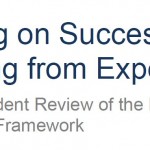I suspect that this may win an award for the most contrived title! Let us deal first with the issues of buses. The reference is simply to the fact that I have not posted for a while and have more than one post to make this week! Having dealt with the minor issue of the title we should perhaps turn to the main event, which has nothing to do with buses and everything to do with acknowledging contribution.
On Thursday of this week the REF Academic Steering Group (RASG) which I chair will meet in the presence of the Vice-Chancellor to recommend the final selection of outputs, and associated staff, across all the Units of Assessment in which we intend to make a return in REF2014. Just to be clear our submission is made in November of this year but the results are due in December 2014 which seems a life time away just now and I can feel the wait dragging already!
The point I would like to make, however, is that the inclusion of outputs is only one way of contributing to our REF submission and all researchers at BU have, and will, help shape our submission. Outputs account for only 65% of the overall research profile in any given Unit of Assessment (UOA), the other 35% is down to environment (15%) and impact (20%). Unlike RAE2008, data collection for REF2014 is based on HESA codes rather than the returned FTE and, therefore, metrics which support environment – research income, doctoral completions and esteem – are based on the collective performance within a given HESA code. To put it bluntly they are not tied to specific individuals who have outputs that are returned. This means that even if a member of staff does not have outputs selected for inclusion, they may have contributed strongly to the research environment through leadership, income generation or student supervision. Similarly impact is based on a series of case studies, two for the first 14.99 FTE and an additional one for every subsequent 10 FTE. Again there may be cases where some individuals have generated impact case studies but don’t have sufficient outputs at the required threshold to be returned. In many ways these individuals have contributed more than anyone to our REF submission.
So the message is a simple one: even if your outputs are not selected for submission this week, all staff are making some form of contribution to our REF submission. We should also not forget those that are making a contribution through their teaching enabling others to focus on research. REF is a collective not an individual endeavor. It is a game, and yes it is a game of high-stakes, that we must play and play well to ensure that the reputation of BU as a leading research institution is maintained, something which is a core part of our collective commitment to Fusion and BU2018.
 Lord Stern’s REF Review- the outcome
Lord Stern’s REF Review- the outcome Three for the price of one: Keynote Talk, Outstanding Contribution Award and Media Appearance.
Three for the price of one: Keynote Talk, Outstanding Contribution Award and Media Appearance.










 Upcoming opportunities for PGRs – collaborate externally
Upcoming opportunities for PGRs – collaborate externally BU involved in new MRF dissemination grant
BU involved in new MRF dissemination grant New COVID-19 publication
New COVID-19 publication MSCA Postdoctoral Fellowships 2024
MSCA Postdoctoral Fellowships 2024 Horizon Europe News – December 2023
Horizon Europe News – December 2023